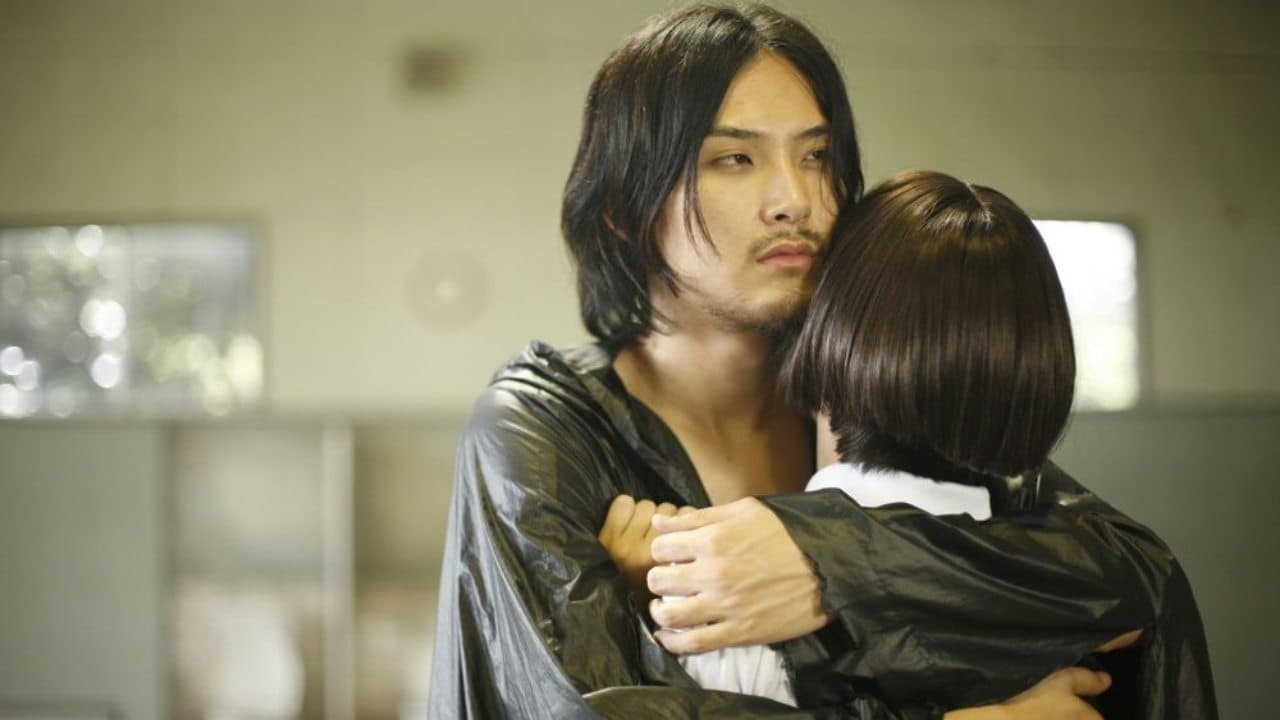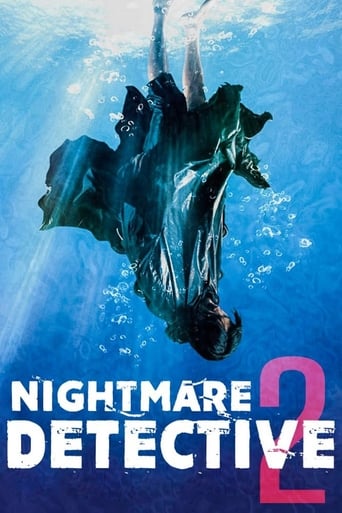



That was an excellent one.
Most undeservingly overhyped movie of all time??
There is, somehow, an interesting story here, as well as some good acting. There are also some good scenes
View MoreThe movie's not perfect, but it sticks the landing of its message. It was engaging - thrilling at times - and I personally thought it was a great time.
View More'Damn, who will save me, then?' This is my favorite quote from the film, spoken by the protagonist, Kyoichi, who can enter the dreams of others, and sometimes dispel the the bad ones.Kyoichi is the nightmare detective. Way too much of this film consists of short segments from his childhood: his mother's many fears including her fear of his telepathy, her suicide, his father's leaving her when Kyoichi was very young, Kyoichi trying in vain to find his mother after her death.The other thread concerns a group of girls who were nasty to another girl, Kikukawa. They suffer bad dreams for having done this. One of the guilty, Yuki, consults Kyoichi, who tells her to seek out the victim and sincerely apologize to her.The bullying girls decide, more or less by omission, not to apologize. Then two of them die. Yukie consults Kyoichi again; he gives the same response.At Kyoichi's request, Yukie meets Kikukawa in a dream. Yuki apologizes to no avail. Kyoichi intercedes, but Kikukawa does not settle into any kind of peace. He starts strangling Kikukawa to resolve the matter. In a parallel dream, Kyoichi's mother strangles him as repentance for bringing him into the world. This breaks the impasse, and all the stranglings cease. Like Kyoichi's mother, Kikukawa is afraid to live in this waking world.In various dream levels, Kyoichi holds and comforts Yuki, Kikukawa, and his mother all at the same time. Since he has nothing to lose in the waking world, he says he will stay as long as they need.Unfortunately for Yukie, the curse of telepathy surfaces in her. She and Kyoichi can communicate fluently without speaking.The resolution at the end seems only partial; is there a sequel in the works?----Scores-----Cinematography: 5/10 Dark, grainy, soft focus. Add in the habit of jerky camera movements, and some odd framing choices.Sound: 7/10 Some of the incidental music is decidedly tinny.Acting: 7/10 Good. I think.Screenplay: 7/10 Both simple (not much happens in the real world) and multi-layered (dreams within dreams and the like), the story has a lot to capture the attention. As with many psychological dramas, there is a lot of sound and fury that signifies very little. Kyoichi has not learned to live with his mother's inability to deal with his telepathy. Got it. Yukie has a hard time the fact that her father is absent and her mother is distant and too devoted to work. Got it. Kikukawa has other fear issues. Got it.
View MoreI remember thinking the first Nightmare Detective was a pretty good film, but fairly conventional as far as the great Shinya Tsukamoto is concerned. This sequel is a huge improvement. Ryuhei Matsuda returns as the titular detective. He is recruited by a high school student (Yui Miura) to dissipate her nightmares, which are being haunted by a still living classmate whom she and her friends bullied. Matsuda finds similarities between the girl's problems and his own nightmares, which concern his mother (Miwako Ichikawa), who attempted to murder him twice before ending her own life. There is a great uneasiness to the picture: for one, thing, it's always quite ambiguous on whether we're in the real world or a dream. I think a good 90% of the film does take place in dreams. There are tons of frightening images, but Tsukamoto is incredibly subtle in his direction (I must say, though, I'm no fan of the hand-held, digital camera work). The film handles the emotions of Matsuda's past beautifully, and, in the end, the film is surprisingly moving.
View MoreI'm usually wary of IMDb consensus but in this case I must agree, the sequel completely trumps the first Nightmare Detective. It's still very much Paprika made as a J-horror but Tsukamoto here is trying to reach outside of the comic book panel.Kiyoshi Kurosawa presented us in Kairo with the stage of a grand guignol theatre where the horror came from the dissolution of the self, but the horror was distant, observed from behind screens. Here, grief and horror flow from one another in a touching cause and effect. It's a jittery, vivid, film, and Tsukamoto's nervous camera makes sense in context, unlike the previous film.At least on one level, it's an easy film to like or dislike. It plays like a best-of showreel of archetypal J-horror moments, we know them almost by heart and they pose little challenge. If they work for the viewer elsewhere, they should work here too. If we find in J-horror a cinema of scares and foreboding, Nightmare Detective 2 is a scary film.Lesser directors like Shimizu and Nakata have been there, so what does Tsukamoto add to the heady brew? In a sense, the film works for me in how it eschews J-horror. Tsukamoto draws on broad ideas and explores them only in general directions, but it's that effort to reach from beyond the pale, the supernatural, back into what is essentially human about suffering that marks him separate.In Vital he asks where does the soul reside. Here he is confounded with human suffering, where does this war inside us come from. The abstractions of this he uses, two separate characters who are inexplicably mortified of life, are rather naive, lack the complexity of a human portrait, but in this exaggeration he builds earnestly.Love heals, he tells us. It's a shockingly humane conclusion to arrive at for the director of Tetsuo, but I welcome the emotional clarity. It's poignant for me then that he gives us this with a shot of the Nightmare Detective hugging in a dream the mother that scarred him so much as a child. The mother is dead now and the absolution exists only in the dreamer's mind, but it's enough that forgiveness exists there.Another moment brilliantly exemplifies this. When the Nightmare Detective mercifully strangles a young girl to set her free from her traumatized life, we see his reflection in a mirror and in place of a head we see a yawning void. Ultimately he stops, this is not his choice to make and if we can't do anything for others, it's enough to be close.Dreams within dreams, dreams where the dreamer is sinking into a bottomless sea, unable to wake up, these work as metaphors of souls in disconnect, in solitary struggle with inner demons, yearning to wake up to a life of peace.
View MoreBe it as it may be, I think I've grown into being a Shinya Tsukamoto fan-boy over the years. I simply haven't seen one bad film by the man yet. And fans of Asian cinema will most likely concur with me on this. While his older, more outrageous films are just as shocking as they are fun, his later work developed into more thought-provoking, equally disturbing at times, fantastic cinema. You don't even have to like his films, but the least anyone can say is that they are intriguing and interesting.In 2008 Tsukamoto presented us with NIGHTMARE DETECTIVE (aka AKUMU TANTEI), introducing an unlikely hero in the form of Kyoichi Kagenuma (Ryuhei Matsuda), a troubled young man who has the ability of entering other people's dreams, or in this case nightmares. While the first NIGHTMARE DETECTIVE was a solid supernatural serial killer/slasher entry, this sequel is injected with a completely new storyline, resulting on the one hand in a slightly gentler film and on the other: An even more discomforting picture on a psychological level.Ryuhei Matsuda reprises his role as the Nightmare Detective, but this time his character feels much more tormented. While filling his days with trying to understand personal demons from the past and contemplating thoughts of suicide to end this dubious ability he has been gifted with, his life will take another meaningful turn when he is contacted by Yukie. She and her friends once played a cruel joke on a fellow student, Kikukawa, and now she is plagued by horrible nightmares in which her friends die one by one. When her friends start dying of unnatural causes in real life, Yukie fears she'll be next.In my opinion, NIGHTMARE DETECTIVE 2 surpasses it's predecessor on almost all levels. For one thing, though the film has a slightly more poetic feel to it (as opposed to the dark and chaotic nature of the original), it's laden with depression and grief, adding a foreboding atmosphere that grows stronger as the film progresses. While the first film had a more straightforward plot (albeit still following Tsukamoto's puzzling logic at times), now the story features a well-balanced duality. When Kyoichi starts to learn more about the origin of Yukie's nightmares, he discovers parallels with his own past which will eventually lead to more discoveries concerning the mystery of his own, cursed persona.AMUKU TANTEI 2 is all about unexplainable things that inflict sheer terror on human beings and how they leave victims psychologically devastated. It is as much a true horror film as it is a psychological drama. Rest assured, certain scenes do get scary at times, though expect a bit more subtlety this time. Don't expect things clearly spelled out for you either, but more a visual language that explains things to a satisfying degree. Through Kyoichi's character Tsukamoto successfully tries to define the nature of terror – or at least providing one specific insight to it for Kyoichi – and it surprisingly results in a film that's far more sophisticated than anyone could expect from a sequel.NIGHTMARE DETECTIVE 2 can actually be viewed as a stand alone film (due to the new storyline), however, watching the original first is always advisable (if only it was to better understand the weight of Matsuda's character). And for once I'd love to see another sequel made (only with Shinya Tsukamoto at the helm, of course). Kyoichi Kagenuma is by far one of the most original and intriguing anti-hero characters I've seen coming out of Asian cinema over the last few years. The possibilities of developing his character seem limitless, and with this second film being very different in tone, I'm most interested in seeing what a third film would bring us. Maybe a Nightmare Detective Trilogy would be a nice way to wrap things up?(from the Cult Reviews vault, with kind permission)
View More